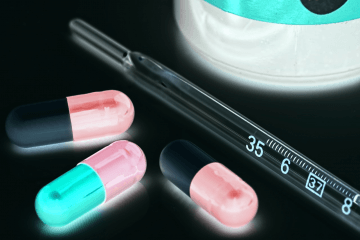Hypothyroidism is on the rise and the standard medical treatment for it is generally unsatisfactory, in my opinion.
Usually, a patient will present to the doctor’s office with one or more symptoms including lethargy/tiredness, sensitivity to cold / cold extremities, sluggishness, weight gain, constipation, dry skin, high cholesterol, etc. The doctor will run a blood test for Thyroid Stimulating Hormone (TSH) and, if high, will place the patient on l-thyroxine (“Synthroid”) medication. Then the dose will be titrated over time until the patient’s blood value of TSH is “within range”.
The major problem with this approach, as many hypothyroid patients have already figured out, is that getting the TSH value “in range” does not necessarily mean that the patient no longer has any clinical symptoms.
Before highly specialized and advanced blood tests were available, medical practitioners used to rely on clinical signs and symptoms to guide their treatment. It seems that this art is somewhat lost now, with an ultra-reliance on lab markers and somewhat of a dismissal of how the patient actually feels.
As it turns out, one of the treatments that our medical forefathers used to give for hypothyroidism was part of the thyroid of an animal to a patient. This is called a desiccated thyroid gland, and many people today are finding out that taking a prescription desiccated thyroid such as Armour or Naturoid gives them more symptom relief than Synthroid does. This is because desiccated thyroid provides both T4 and T3, T3 being the “active” thyroid hormone, while Synthroid only provides T4.
It seems that the main reason why medical doctors are reluctant to use desiccated thyroid is because of a slightly lower standardization in dose (usually this is not clinically relevant, though) which makes Synthroid “easier” to prescribe.
Thus, if you have Hashimoto’s or general hypothyroidism, are on Synthroid, and are not finding the symptom relief that you want, it may be worthwhile to talk to your doctor about trying Naturoid.
To find out from the start if you would do well on Synthroid or would need desiccated thyroid, the medical practitioner should do a complete thyroid panel. This would provide much more information about what exactly is wrong with your thyroid or even liver!
You see, your thyroid is actually only responsible for making 20% or so of the active thyroid hormone T3. The liver and intestines are responsible for making up to 80% of the T3 floating around in your body (with some other tissues, such as skeletal muscle, and organs making a small amount as well). They make the T3 from the T4 that your thyroid gland created and dumped into the bloodstream.
A full thyroid panel includes TSH, T4, free T4, T3, free T3, reverse T3, and the thyroid antibodies AbTBG and AbTPO. If the results of your thyroid panel showed normal levels of T4, low levels of T3, and a high TSH, for example, this would indicate that your thyroid is already spitting out enough T4, but the tissues responsible for converting T4 to T3 (liver is the big player here) are not doing their job. Does it make sense, in this case, to just provide more T4 (what Synthroid does)? No, it doesn’t. Unfortunately, this is what many people who test only their TSH end up taking. No wonder it does not solve their symptoms.
What would make more sense is to provide the T3 that is not being created, and this can be done by taking Naturoid or another type of desiccated thyroid.
What would be even better is to try to figure out the root cause of what is causing your body not to perform the conversion of T4 to T3 properly in the first place. This can be done by working with a competent functional medicine practitioner who will perform various lab testing to uncover this “root cause” and will then suggest lifestyle, nutrition, and/or supplementation strategies to help correct the issue. Going this route will not only make the patient feel better but will likely allow them to lower their dose of medication.
For more information on how to help yourself with thyroid issues naturally, browse the Health Conditions Index section of this site!
As always please leave any comments, questions, or experiences below. I would love to hear from you!


1 Comment
Kathleen Marie Tolle · October 1, 2022 at 11:52 pm
I was told by Dr. Joe Feret that you found Black Seed Oil to help with Hashimotos. I just picked up some and they come in a capsule of 600 mg. Is that a sufficient amount to help?